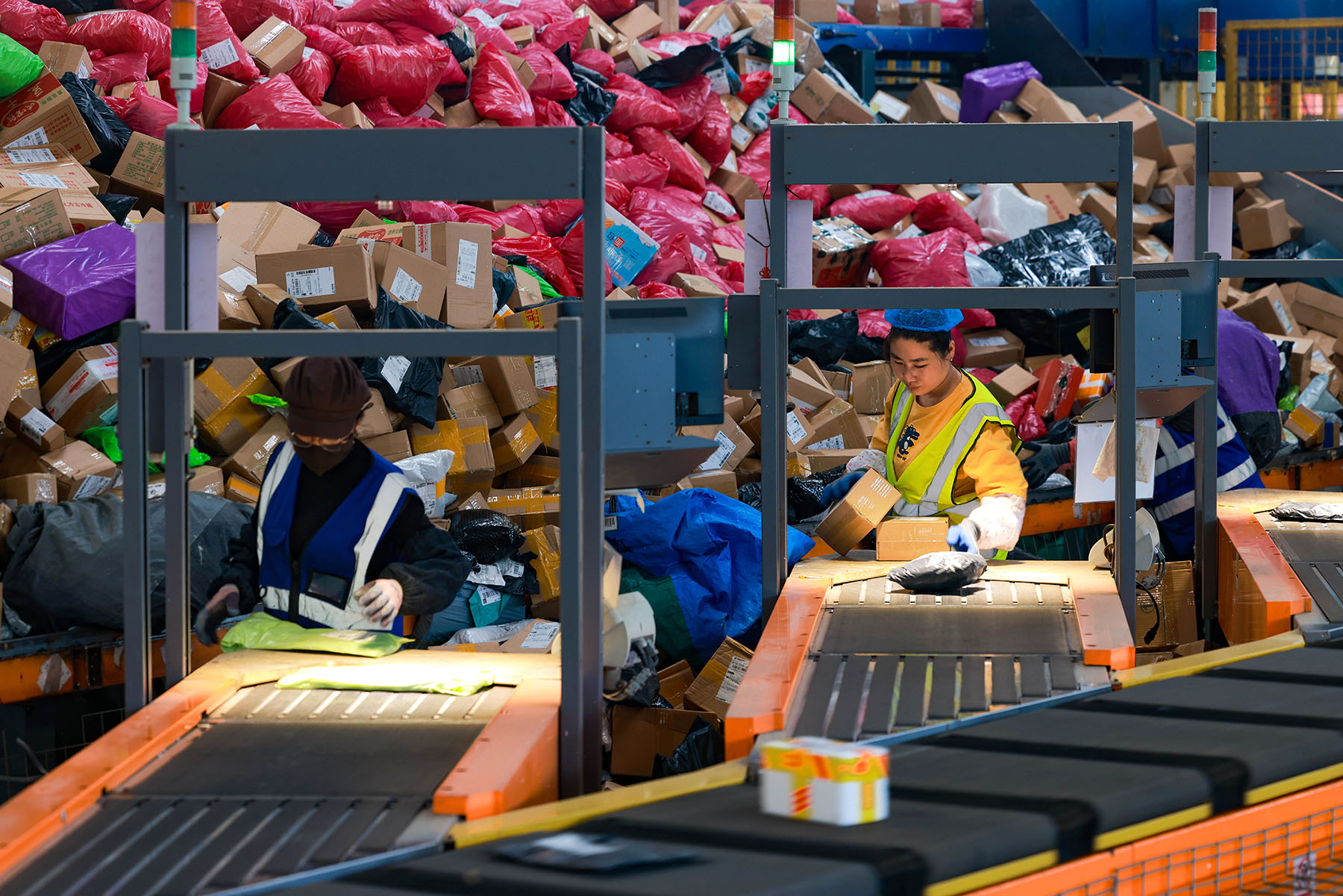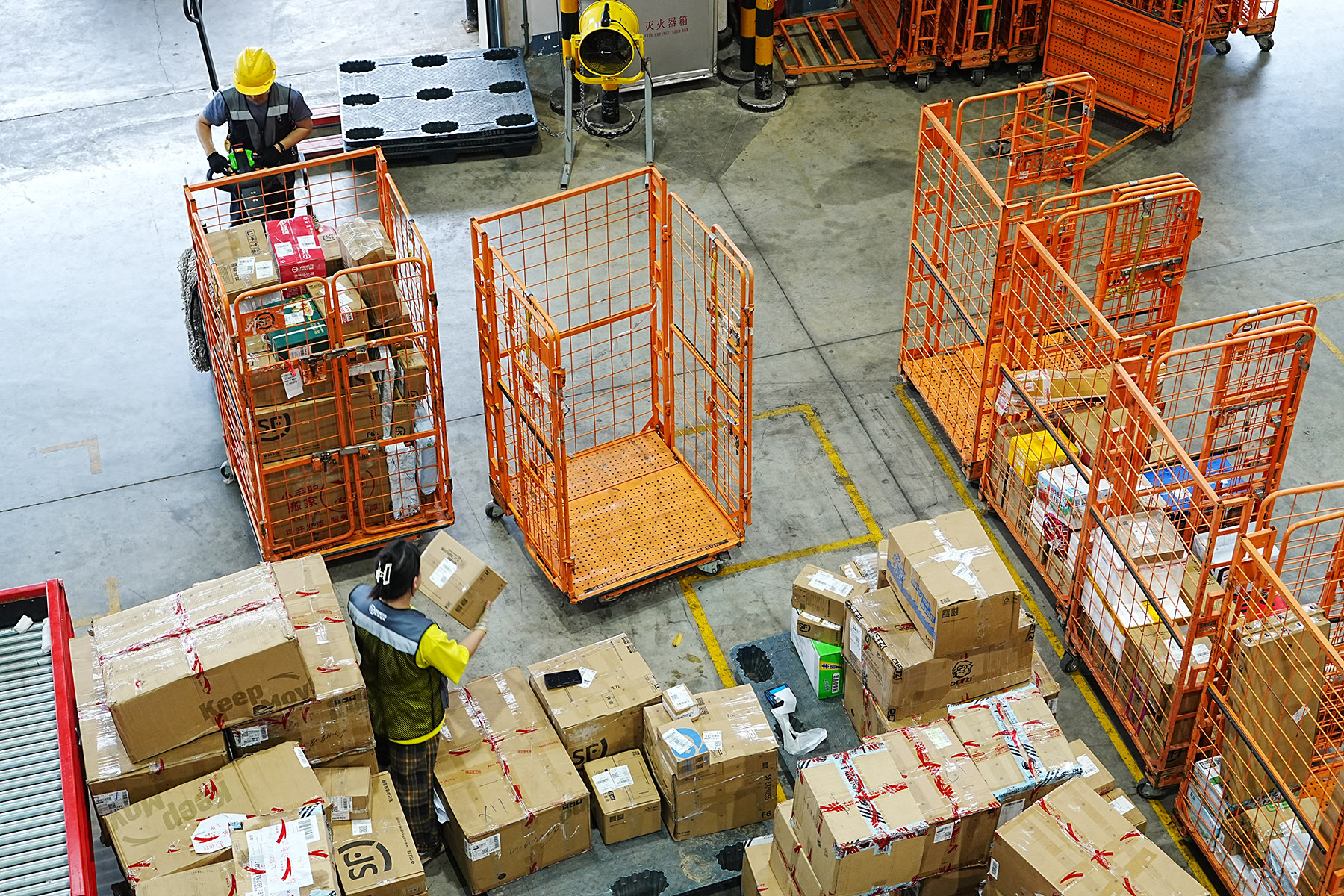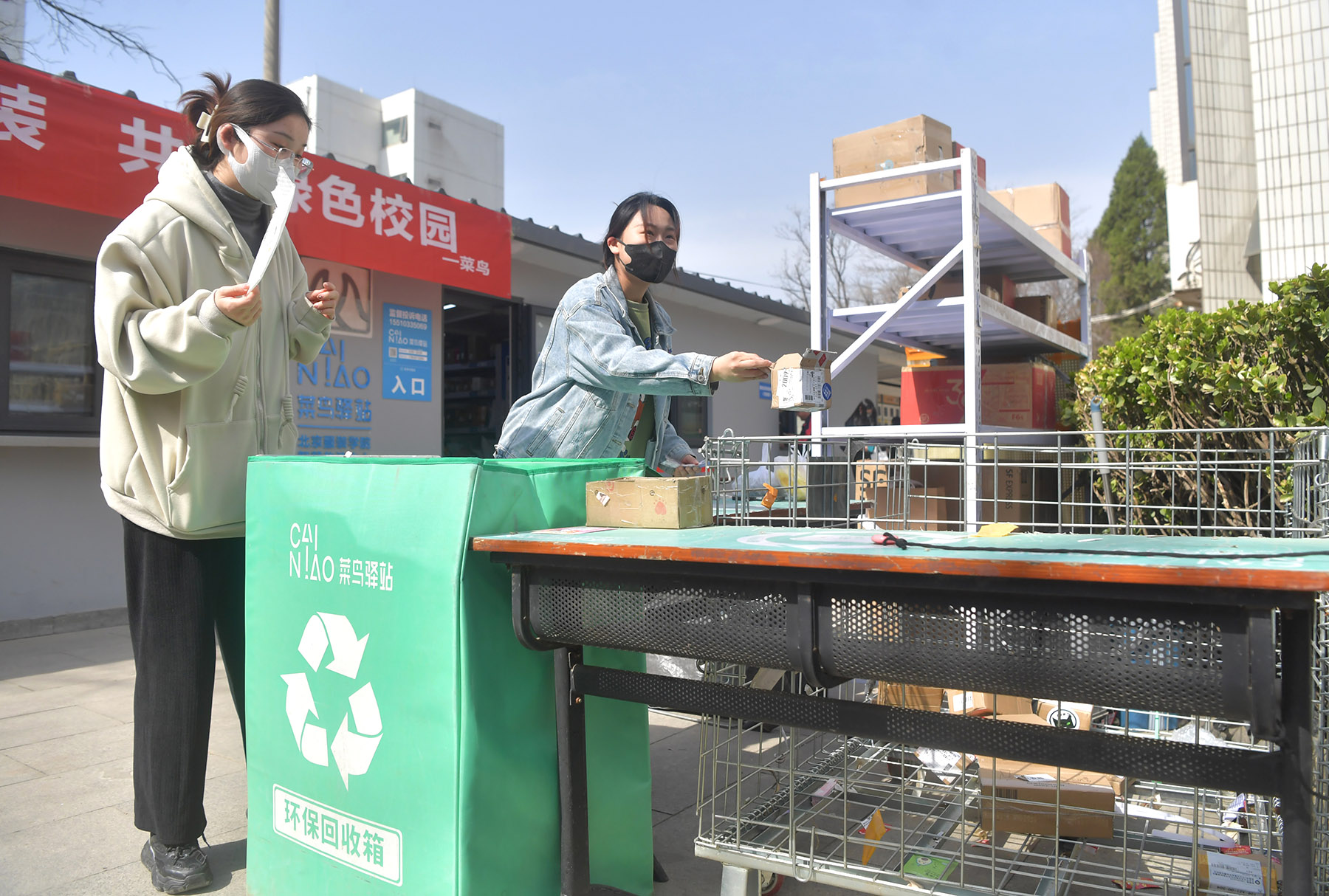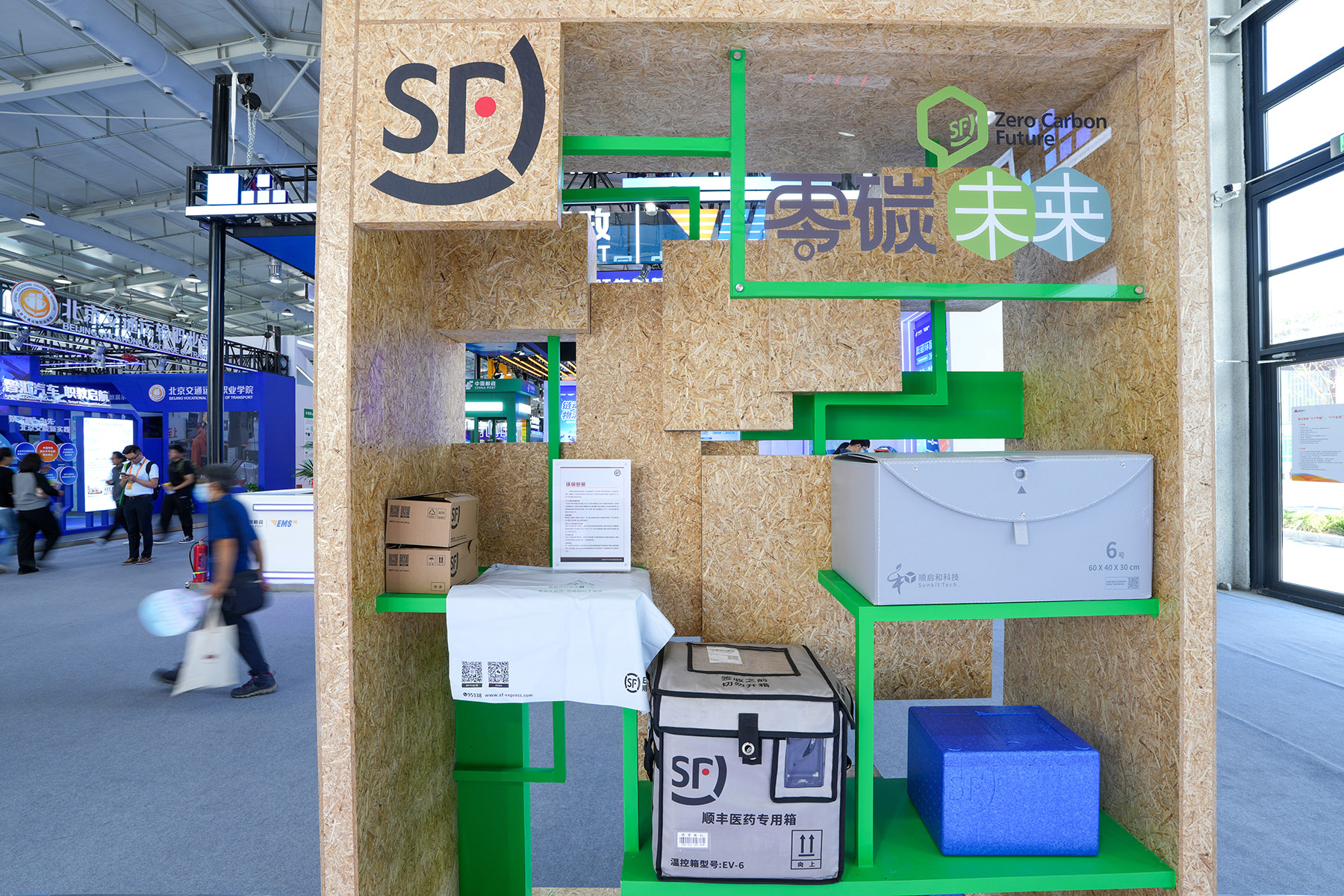Express delivery companies taking action to reduce waste

Editor's note: China Daily is publishing a series illustrating the country's efforts to achieve its carbon peak and carbon neutrality goals.
With express delivery ubiquitous in China, where almost 175 billion packages were delivered last year, the public and private sectors are taking steps to address the reduction of packaging waste and forge a more sustainable way forward for the rapidly growing industry.
Last year, express deliveries in China reached 174.5 billion, the most for any country in the world for the 11th straight year, and a rise of 21 percent year-on-year.
According to a report released by the State Post Bureau, in 2022 alone, approximately 9.92 billion packaging boxes and about 16.98 billion meters of tape were consumed in China's express delivery sector.
This staggering volume has raised growing concerns about the environmental impact of packaging waste and excessive material consumption.
READ MORE: Green fashion turns old plastics into profits
As of June 1, the State Council will require express delivery companies to promote greener, reduced and reusable express packaging, according to an updated regulation on the industry. The update stresses that eco-friendly, biodegradable and reusable materials are used in express delivery packaging, while avoiding excessive and wasteful packaging.
In recent years, major express delivery companies in China and postal authorities have made efforts to reduce material use, recycle packaging materials and develop degradable materials, however, more action is still needed.

Reduced materials
Express delivery companies typically repackage goods using their own branded boxes, however, more recently, some shipments are being made using original boxes to save on excess packaging.
Gao Jiaqi, who is in charge of JDL Express' intelligent logistics park in Hangzhou, Zhejiang province, said direct shipments are becoming more commonplace.
"When goods arrive at our warehouses from the manufacturers, we ship them directly to consumers without any repackaging," Gao said. JDL is the logistics branch of the e-commerce platform JD.
"Couriers only need to put an express waybill on the original package for goods suitable for direct shipments, such as packed tissues and diapers, and small electronic devices in individual packages," Gao said.
In total, direct shipment helped JDL reduce over 1 billion repackages last year.
ZTO Express, another major express delivery company in China, has been promoting the same practice. "Currently, all warehouses prioritize shipping goods in their original packaging from merchants," said Xu Yonggui, head of the marketing and branding department of ZTO Cloud Warehouse Supply Technology.
While direct shipment without repackaging reduces costs and waste, the product categories suitable for the shipment remain limited. "Smartphones and beauty products cannot be shipped directly in their original packaging," said Xu.
Since 2022, nearly 300 of ZTO's warehouses nationwide have used an intelligent system to recommend the most efficient repackaging.
"Suitable packaging avoids over-packaging, lowers costs and improves consumers' shopping experience," said Bian Yanjue, director of the customer service department of Beingmate, a corporate client of ZTO.
Express delivery companies have also been exploring ways to reduce material usage in packaging.
In 2023, JDL said it cut its use of cardboard boxes from between 5 to 25 percent by changing their design.
Last year, over 860 million of these upgraded boxes were used, reducing 12,164 metric tons of carbon emissions, the company said.
JDL said it had also reduced plastic in its express bags by 20 percent.
"To reduce plastic tape usage, we no longer use the traditional cross-wrapping method," Xu said. "Instead, we now secure packages using one to three strips of tape, depending on the box size." These more efficient taping methods have also been widely adopted across the industry.

Recycle and reuse
Despite more efficient material use, single-use packaging still generates a significant amount of waste. To extend the life cycle of boxes, express delivery companies and postal services have introduced reusable circulation boxes designed for multiple uses.
Reusable plastic boxes are circulating in logistics stations of JDL Express, SF Express and Deppon Express for inter-station transportation, saving single-use packaging.
In Haikou, Hainan province, reusable boxes are being used for the delivery of resident ID cards via a collaboration between the local post office and the province's ID card production center.
"Once an ID card is produced, it is transferred to the post office, which then delivers it either directly to individuals or to one of 415 police stations across the province for residents to collect," said Zeng Qiqi, director of the marketing department of China Post in Hainan.
The waterproof reusable boxes have been used for delivering ID cards in Hainan since 2023, according to Zeng. "These boxes can be used over 50 times. After delivering a batch to the police station, we retrieve the empty box for reuse in the next delivery. For individual deliveries, we use biodegradable packaging instead," he said.
While the amended regulation puts more emphasis on the responsibility of express companies, the actions of consumers also matter for waste reduction.
Xu from ZTO noted that product returns by consumers are another significant source of packaging consumption. To address this, ZTO is piloting a specially designed cardboard box that can be reused up to three times for returned goods.
To tackle the express packages flooding into its campuses every day, Zhejiang University has operated a package collection program since 2016, serving around 100,000 people.
"Students open their packages and leave the cardboard boxes at the station for reuse," said Yao Xin, chairman of the logistics group at Zhejiang University. "In one station, over 200 packages are collected every day, which will later be provided to students for free."
Last year, over 8.2 million parcels were delivered to Zhejiang University campuses, according to Yao. A further 440,000 parcels were sent out from those campuses.
At the delivery station's mailing counter, 90 percent of the packaging boxes are reused. Deng Kaikun, a 19-year-old freshman at the university, said that reusing boxes has already become a daily habit for him.
"If I don't have a box for mailing, the staff give me one for free," Deng said.
"Whenever I open a package, I leave the box here clean and intact so it can be reused."

Biodegradable packaging
From December 1, 2020, Hainan became the first province in China to legislate against nonbiodegradable plastic use. Accordingly, the province has promoted the use of fully biodegradable plastics, which have been widely applied in the local express delivery industry.
Zhongkexinhui (Hainan) New Material Technology Co, established in 2019, produces fully biodegradable packaging bags in cooperation with the Technical Institute of Physics and Chemistry of the Chinese Academy of Sciences. Its annual production capacity of fully biodegradable plastics is 10,000 tons, including 3,000 tons for express packaging bags.
Wu Jun, the company's president, said that these fully biodegradable bags have gone through rigorous quality tests and fulfill express packaging requirements. "Thanks to government support and policy promotion, express companies have become aware of the importance of degradability," he said.
Last year, 13 million fully degradable bags were sold. A surge in demand was seen from January to March this year, with over 7 million being sold during the period, according to Wu. The company's clients include major express firms such as Yunda Express, ZTO Express, STO Express and YTO Express.
Lu Bo, a senior engineer from the CAS institute, said that the fully biodegradable material is made of PBAT and PLA, and decomposes into water and carbon dioxide in compost within 180 days. PBAT and PLA are biodegradable polymers made from corn starch.
"Though the cost of the biodegradable material is relatively high, application on a larger scale could help lower the cost," said Lu. "Promoting biodegradable materials in the express delivery industry is meaningful as it has wide coverage and could raise public awareness of environmental protection."
ALSO READ: Booming recycling market benefits environment
To meet the requirements of the plastic ban, SF Express in Hainan has used fully biodegradable packaging bags and degradable tapes since 2021. Over 40 million bags have been used since 2021, and degradable tapes are used in all delivery stations across the province, according to Shen Qi, head of SF Express' green packaging project.
These degradable materials will be promoted gradually across the country, Shen said.
Zhu Li, deputy director of the industry department at the development and research center of the State Post Bureau, said that as green packaging in the express delivery sector involves multiple stages from production, usage and recycling to disposal, coordinated efforts across the entire supply chain are essential.
"The amended regulation specifies responsibilities of relevant parties in promoting green express packaging and outlines enforcement and monitoring mechanisms, providing a solid legal foundation for managing sustainability throughout the industry chain," Zhu said.
Contact the writer at lishangyi@chinadaily.com.cn


